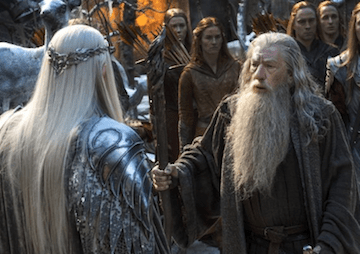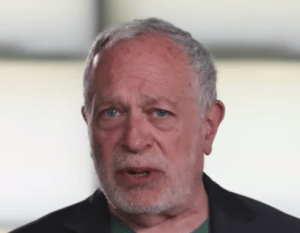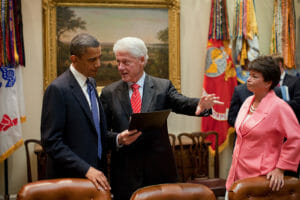J.R.R. Tolkien’s ‘Profoundly Conservative’ Myths
"Both 'The Hobbit' and 'Lord of the Rings' turn on the 'return of the king' to his rightful throne," and in both stories " 'victory' means the reassertion of a feudal social structure which had been disrupted by 'evil,' " fiction author Damien Walter writes of some of the 20th century's most celebrated works of imagination. Gandalf addresses the Elvish leadership. Photo by Warner Bros. Pictures
Gandalf addresses the Elvish leadership. Photo by Warner Bros. Pictures
“Both ‘The Hobbit’ and ‘Lord of the Rings’ turn on the ‘return of the king’ to his rightful throne,” and in both stories ” ‘victory’ means the reassertion of a feudal social structure which had been disrupted by ‘evil,’ ” fiction author Damien Walter writes of J.R.R. Tolkien’s books, some of the 20th century’s most celebrated works of imagination.
Walter loves the dramas Tolkien created, but he’s trying to come to grips with their political and social implications — a legitimate function of critics, whose role is to explicate the meanings of works of art in whatever direction they find both interesting and possible.
He explains that both books are “one-sided recollections” made by members of the landed gentry (the Baggins family) — “an unreliable historical source if ever there was one.” Furthermore, the historians present their personal antagonist — Sauron — as a huge burning eye, “exactly the kind of treatment one would expect in a work of propaganda.”
Walter continues at The Guardian:
Myths are a lens through which we investigate the mysteries of the world around us. Change the myth, and you can change the world – as JRR Tolkien well knew when, alongside other writers including CS Lewis, he began to consider the possibility of creating new myths to help us better understand the modern world – or if not to understand it better, then to understand it differently. Tolkien borrowed the Greek term “mythpoesis” to describe the task of modern myth-making, and so the literary concept of mythopoeia was born.
… We’re left to take on trust from Gandalf, a manipulative spin doctor, and the Elves, immortal elitists who kill humans and hobbits for even entering their territory, when they say that the maker of the one ring is evil. Isn’t it more likely that the orcs, who live in dire poverty, actually support Sauron because he represents the liberal forces of science and industrialisation, in the face of a brutally oppressive conservative social order?
The Hobbit and Lord of the Rings aren’t fantasies because they feature dragons, elves and talking trees. They’re fantasies because they mythologise human history, ignoring the brutality and oppression that were part and parcel of a world ruled by men with swords. But we shouldn’t be surprised that the wish to return to a more conservative society, one where people knew their place is so popular. It’s the same myth that conservative political parties such as Ukip have always played on: the myth of a better world that has been lost, but can be reclaimed by turning back the clock.
Read more here.
— Posted by Alexander Reed Kelly.
Your support matters…Independent journalism is under threat and overshadowed by heavily funded mainstream media.
You can help level the playing field. Become a member.
Your tax-deductible contribution keeps us digging beneath the headlines to give you thought-provoking, investigative reporting and analysis that unearths what's really happening- without compromise.
Give today to support our courageous, independent journalists.






You need to be a supporter to comment.
There are currently no responses to this article.
Be the first to respond.